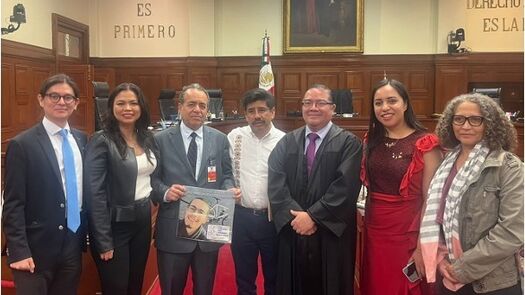December 19, 2025
The Ecuadorean Coalition for Safe Mobility, comprised of 44 civil society organizations (CSOs), formally launched on November 17. The Global Health Advocacy Incubator (GHAI) and other partners, with support from the Bloomberg Philanthropies Initiative for Global Road Safety (BIGRS), have been providing advocacy communications and related technical assistance to these CSOs over the past year as they worked to develop a set of recommendations and transformed into a formal coalition.
During the launch, the Coalition delivered a set of recommendations on the 2021 Transit Law to the President of Ecuador, the Minister of Transportation and Public Works, and the Director of the National Agency of Transportation. This set of recommendations contains information on international best practices related to speed, drink driving, seatbelt use, helmet use, and child restraint systems, and are the five behavioral risk factors prioritized by the Coalition.

Members of the Coalition for Safe Mobility in Ecuador
In addition, the set of recommendations analyzes and proposes articles on the topics of active mobility, and the rights of pedestrians and bicycle users. The delivery of the recommendations to the government is timely given that the National Transportation Agency will begin drafting the implementing rules and regulations in the coming weeks and will rely on the input by the civil societies.
The Coalition for Safe Mobility in Ecuador has been advocating for the government to finalize implementing rules and regulations for over a year, since the Transit Law was passed. When the government published the 2021 Transit Law in August 2021, the law stipulated that within a period of 180 days the President of Ecuador, in coordination with the National Transit Agency and the Ministry of Transportation and Public Works, should issue the law’s regulations. Yet the 180-day deadline passed in early February.
The Coalition for Safe Mobility knows that there is no time to lose. In Ecuador, according to data from the National Transit Agency, from January to September 2022, more than 16,210 crashes have been registered, causing the death of 1,645 people and leaving 14,073 injured. These figures mean that every 4 hours a person dies on the roads in Ecuador. The initiatives and daily work undertaken and supported by civil society have made it possible to position and defend the importance of road safety, active and sustainable mobility, and the rights of vulnerable road users as a key public health issue.
The launching of the Coalition for Safe Mobility in Ecuador is an important milestone for the country. The Coalition’s launch also symbolizes their ongoing work to reduce the deaths and injuries that needlessly happen every single day on Ecuador’s roads.

Top-level government officials receiving the proposal



